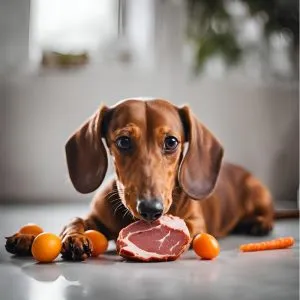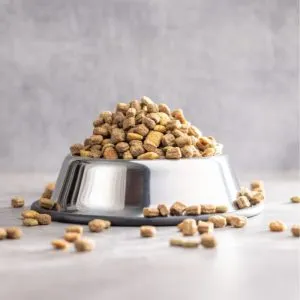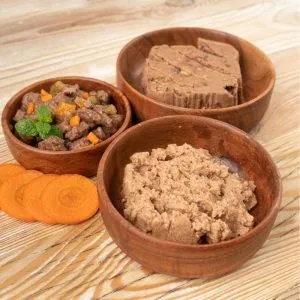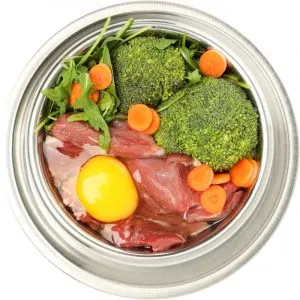If you’re a proud weiner dog parent, you know these adorable sausage dogs have unique personalities, boundless energy, and specific dietary needs. Choosing the Best Dog Food For Weiner Dogs isn’t just about picking any kibble off the shelf—it’s about finding the perfect balance of nutrition to keep them healthy, happy, and full of energy.
In this comprehensive guide, we’ll explore how to pick the ideal food for your weiner dog, emphasize the importance of reading food labels, discuss the various types of dog food available, and help you determine what suits their little yet mighty bodies best. Proper nutrition is the cornerstone of their well-being, especially given their distinct physical characteristics and common breed-specific health concerns. Making informed choices about their diet will contribute significantly to their longevity and quality of life, allowing them to enjoy every adventure with you.
Why Do Weiner Dogs Need Special Nutrition?
Weiner dogs, despite their small stature, have a body shape, active nature, and potential health issues that make their diet exceptionally important. Understanding these factors is key to providing them with the right nutritional support.
Unique Body Shape and Spinal Health
Weiner dogs’ long spines and short legs are their most distinguishing features, but they also make them particularly prone to back problems, especially if they become overweight. Conditions like Intervertebral Disc Disease (IVDD) are a significant concern for the breed, where extra weight places immense pressure on their delicate spines, increasing the risk of disc herniation. To help mitigate this, the best dog food for weiner dogs should ideally include ingredients like glucosamine and chondroitin. These supplements are known to support joint and spinal health, which is vital for maintaining their mobility and comfort throughout their lives. Prioritizing these ingredients can make a substantial difference in preventing future health complications.
 A healthy Dachshund on a walk, emphasizing its long body shape
A healthy Dachshund on a walk, emphasizing its long body shape
Active Lifestyle and Weight Management
Weiner dogs are lively companions, always eager for playtime or an outdoor adventure. However, their small size combined with a love for treats means they are quite susceptible to obesity and related conditions like diabetes. This makes careful dietary management crucial. The most suitable food for weiner dogs will contain adequate protein for muscle maintenance while offering a moderate calorie count to prevent excess weight gain. Beyond the food itself, diligent portion control is absolutely critical. Regularly monitoring their weight and adjusting their food intake ensures they remain at a healthy weight, which is paramount for protecting their spines and overall vitality.
Common Allergies and Sensitivities
Allergies are a common issue for many weiner dogs, often manifesting as itchy skin, digestive upset, or recurring ear infections. Identifying and avoiding triggers is a major part of managing these sensitivities. A high-quality weiner dog food with a limited number of natural ingredients can be incredibly beneficial in reducing the likelihood of these problems. Opting for formulas free from common allergens like corn, soy, or artificial additives can provide relief and improve your dog’s comfort. Consulting with your veterinarian can help pinpoint specific allergens and guide you toward the most appropriate specialized diet.
How to Read Dog Food Labels Effectively
Before diving into specific food recommendations, it’s essential to master the skill of reading dog food labels. This empowers you to make informed decisions for your weiner dog’s health.
1. Scrutinize the Ingredients List
The ingredients on a dog food label are listed in descending order by weight, meaning the first few ingredients make up the largest portion of the food. Always look for high-quality, named protein sources like chicken, beef, or fish as the very first ingredient. These provide the essential amino acids your weiner dog needs for strong muscles and overall health. Conversely, aim to avoid fillers such as corn, soy, and undefined by-products, as these often offer minimal nutritional value and can sometimes trigger sensitivities in your pet.
2. Identify Essential Nutrients
Weiner dogs require a balanced mix of protein, healthy fats, and complex carbohydrates to thrive.
- Protein: Crucial for muscle growth, repair, and maintenance. Look for dry food formulas with a protein content of 18–25% for adult dogs.
- Healthy Fats: Essential fatty acids, particularly omega-3 and omega-6, are vital for maintaining a shiny coat, healthy skin, and supporting cognitive function. Sources often include fish oil or flaxseed.
- Carbohydrates: Should come from wholesome, easily digestible sources like sweet potatoes, brown rice, or peas, providing sustained energy without unnecessary fillers.
- Vitamins and Minerals: Ensure the food is fortified with essential vitamins like A, E, and B-complex, along with crucial minerals such as calcium and phosphorus for robust bone health and overall bodily functions.
 Close-up of a bag of dog food, highlighting the ingredients label
Close-up of a bag of dog food, highlighting the ingredients label
3. Steer Clear of Artificial Additives
Artificial flavors, colors, and preservatives are common culprits behind allergies or sensitivities in weiner dogs. These synthetic ingredients offer no nutritional benefit and can sometimes lead to adverse reactions. Prioritize natural, high-quality dog food formulations that rely on natural preservatives (like tocopherols) and are free from artificial enhancers. This simple step can significantly reduce the risk of dietary issues and support your dog’s long-term health.
4. Match Food to Life Stage
Just like humans, puppies, adults, and senior weiner dogs have distinct nutritional requirements. Puppies need more calories and specific nutrients for rapid growth, while adult dogs require balanced maintenance. Senior dogs benefit from formulas that support joint health and manage age-related changes. Always select food that is specifically formulated for your dog’s current life stage to ensure they receive the appropriate blend of nutrients for their developmental needs.
Types of Weiner Dog Food
Understanding the different types of dog food available will help you make an informed decision tailored to your weiner dog’s preferences and health needs. Each type offers distinct advantages and disadvantages.
1. Dry Dog Food (Kibble)
Dry dog food, commonly known as kibble, remains the most popular choice for many weiner dog owners due to its convenience, affordability, and shelf stability. The crunchy texture of kibble also offers a dental benefit, helping to scrape away plaque and tartar, thus promoting better oral hygiene. When selecting kibble for your weiner dog, look for:
- Small-sized pieces: Weiner dogs have smaller mouths, so appropriately sized kibble is crucial to ensure they can chew comfortably and prevent choking hazards.
- Breed-specific formulas: Many brands offer kibble specifically designed for small breeds or even weiner dogs. These formulas are often tailored to address their unique nutritional requirements, such as joint support and weight management.
 A bowl of small-sized dry dog food kibble
A bowl of small-sized dry dog food kibble
2. Wet Dog Food
Wet dog food is an excellent option for weiner dogs who are picky eaters or those who need extra hydration. Its higher moisture content makes it highly palatable and can be easier for some dogs to digest. However, consider the following:
- Calorie density: Wet food is often richer in calories than dry food, so precise portion control is essential to prevent unintended weight gain, especially for breeds prone to obesity like weiner dogs.
- Combination feeding: Many owners find success by combining wet food with kibble. This approach offers a balanced texture and ensures comprehensive nutrition, satisfying both taste and health requirements.
 A serving of moist wet dog food in a bowl
A serving of moist wet dog food in a bowl
3. Grain-Free Dog Food
Grain-free dog food can be a beneficial choice for weiner dogs with sensitive stomachs, food allergies, or intolerances to specific grains. These formulations replace traditional grains like corn, wheat, or soy with alternative carbohydrate sources such as vegetables (e.g., sweet potatoes, peas) and legumes. Before transitioning your weiner dog to a grain-free diet, it is always recommended to consult your veterinarian. They can help determine if this dietary change is truly necessary and appropriate for your dog’s individual health profile, as some studies suggest potential links between certain grain-free diets and heart issues in some breeds.
4. Raw or Fresh Dog Food
Raw diets, often consisting of raw meat, bones, and organs, have gained popularity among some pet owners who advocate for their perceived nutritional benefits. Similarly, freshly prepared meals, whether made at home or sourced from specialized subscription services, ensure your weiner dog receives high-quality, minimally processed ingredients. However, these diets require meticulous planning and preparation to ensure they are nutritionally complete and balanced. It is crucial to work with a veterinary nutritionist to avoid potential deficiencies or bacterial contamination risks associated with raw feeding.
 Freshly prepared dog food in a bowl, featuring vegetables and meat
Freshly prepared dog food in a bowl, featuring vegetables and meat
5. Specialty or Prescription Diets
For weiner dogs with specific health conditions such as kidney disease, severe allergies, obesity, or diabetes, a specialty or prescription diet might be necessary. These diets are scientifically formulated to manage or mitigate the symptoms of particular ailments. They are typically available only through veterinary recommendation and are designed to provide targeted nutritional support. Always collaborate closely with your veterinarian to determine the most appropriate specialty diet for your furry friend, ensuring it addresses their health challenges effectively.
What Is the Best Food for Weiner Dog Puppies?
Weiner dog puppies have unique nutritional needs to support their rapid growth and boundless energy during this crucial developmental stage. Selecting the right puppy food is vital for their long-term health.
High Protein and Fat Content
Puppies require a significantly higher intake of protein and healthy fats compared to adult dogs. Protein is essential for building strong muscles, tissues, and organs, while healthy fats provide the concentrated energy needed for their active lifestyle and support vital functions like brain and eye development. Look for puppy-specific formulas with at least 22–32% protein. Additionally, ensuring a healthy dose of fats, including omega-3 and omega-6 fatty acids (such as DHA and EPA), is crucial for optimal cognitive growth and visual acuity.
Appropriate Kibble Size
Weiner dog puppies have tiny mouths and developing teeth, making the size and shape of their kibble incredibly important. Choose food with small, manageable kibble pieces that are easy for them to chew and swallow. This not only prevents discomfort but also minimizes the risk of choking hazards, ensuring a safe and enjoyable mealtime experience.
Added DHA and EPA for Development
Docosahexaenoic acid (DHA) and eicosapentaenoic acid (EPA) are vital omega-3 fatty acids that play a critical role in the healthy development of a puppy’s brain and eyes. Foods enriched with natural sources like fish oil are excellent options to support their cognitive function and ensure sharp vision as they grow. These nutrients are naturally found in mother’s milk and are indispensable for proper neurological development.
Recommended Puppy Foods for Weiner Dogs:
- Purina Pro Plan Puppy Small Breed: This formula is specifically tailored for small-breed puppies, featuring a high-protein recipe with real chicken as the primary ingredient. It includes DHA from fish oil to support brain and vision development, along with antioxidants for a strong immune system. The small kibble size is perfect for weiner dog puppies’ tiny mouths.
- Wellness Complete Health Small Breed Puppy: Crafted with natural, high-quality ingredients, this food supports healthy growth. It contains deboned turkey and oatmeal for easy digestion, DHA for brain development, and a rich blend of vitamins and minerals for overall health. Its balanced formula ensures your pup gets the energy they need to grow strong.
- Royal Canin Dachshund Puppy: A top choice for weiner dog owners, this food is specifically formulated to support healthy joint and bone development, which is critical for a breed prone to back issues like IVDD. The kibble size and shape are uniquely tailored to the weiner dog puppy’s small mouth and distinctive chewing style, making it easier to eat. It also includes antioxidants, vitamins, and minerals to bolster their developing immune system and digestible proteins with prebiotics for a healthy gut.
- Blue Buffalo Life Protection Puppy: This premium option features real meat as the first ingredient, providing essential protein for muscle development. It’s enriched with DHA and ARA (Arachidonic Acid), vital fatty acids also found in mother’s milk, to support brain and vision development. A blend of antioxidant-rich fruits and vegetables boosts immunity, and it’s free from by-product meals, corn, wheat, and soy, making it suitable for puppies with sensitivities.
- Hill’s Science Diet Puppy: Known for its highly digestible ingredients, this is an excellent choice for weiner dog puppies with sensitive stomachs. The formula includes high-quality chicken meal and barley, providing essential proteins and carbohydrates. It also features DHA from fish oil to aid in brain and eye development, along with vitamins, minerals, and antioxidants for a strong immune system and proper skeletal growth.
 A cute Dachshund puppy eating kibble from a bowl
A cute Dachshund puppy eating kibble from a bowl
What Is the Best Dog Food for Adult Weiner Dogs?
For adult weiner dogs, the primary focus shifts to maintaining a healthy weight, supporting their energy levels, and addressing breed-specific needs like joint health. Here are some top picks that offer comprehensive nutrition:
- Royal Canin Dachshund Adult: Specifically formulated for the breed, this kibble is designed to support joint health and helps maintain an ideal weight, crucial for their long spines. Its tailored kibble shape also encourages chewing.
- Blue Buffalo Life Protection Formula Small Breed: Packed with high-quality protein, this formula is excellent for active adult weiner dogs. It includes a precise blend of antioxidants, vitamins, and minerals to support overall health and immune function.
- Wellness CORE RawRev Small Breed: This grain-free option combines high-protein kibble with freeze-dried raw pieces, offering a nutritional boost and supporting lean muscle mass for energetic weiner dogs.
What Is the Best Food for Weiner Dogs in Their Senior Years?
As weiner dogs enter their senior years, their nutritional needs change again, primarily focusing on supporting joint health, maintaining lean muscle mass, and aiding digestion. These tailored foods can help them age gracefully:
- Hill’s Science Diet Adult 7+ Small Bites: A trusted choice for aging weiner dogs, this food is easy to chew and formulated with added antioxidants to support brain health and a strong immune system.
- Nutro Ultra Small Breed Senior: This formula is packed with lean protein, whole grains, and a blend of superfoods designed to support the unique needs of senior small breeds, promoting vitality and overall well-being.
- Royal Canin Dachshund 8+: Specifically designed for senior weiner dogs, this kibble contains nutrients that support joint health and helps combat the effects of aging, keeping them comfortable and active.
Essential Tips for Picking the Best Food for Weiner Dogs
Choosing the right food for your weiner dog can feel overwhelming, but by following these key tips, you can make the best decision for their health and happiness:
- Understand Your Dog’s Specific Needs: Whether your weiner dog is a puppy, an energetic adult, or a wise senior, their food should always align with their current life stage, activity level, and any individual health considerations. Regularly assess their condition and adjust their diet as needed.
- Look for Breed-Specific Formulas: Many reputable brands now offer foods specifically tailored for small breeds or even for weiner dogs themselves. These formulas are often the best dog food for weiner dogs because they are meticulously designed to address their unique requirements, such as supporting spinal health, managing weight, and catering to their chewing style.
- Diligently Monitor Their Weight: Weiner dogs are notorious for gaining weight easily, which can put immense stress on their delicate spines and exacerbate health issues like IVDD. Even slight overfeeding can lead to significant problems. Regular weigh-ins and strict portion control, guided by feeding recommendations and your vet’s advice, are crucial for their long-term health.
- Always Consult Your Veterinarian: Your veterinarian is your most valuable resource when it comes to understanding your weiner dog’s dietary needs. They can provide personalized recommendations, especially if your dog has underlying health concerns, allergies, or requires a specialized diet. Regular check-ups and open communication with your vet will ensure your weiner dog receives optimal nutritional care throughout their life.
Finding the Best Dog Food for Your Beloved Weiner Dog
Your weiner dog deserves nothing but the best, and selecting the right food is one of the most critical decisions you will make as a pet parent. By thoroughly understanding their unique dietary needs, learning to interpret dog food labels effectively, and thoughtfully choosing high-quality products, you will lay a strong foundation for your furry friend to thrive at every stage of their life.
Whether you opt for a specialized kibble, a moist wet food, or a carefully managed fresh diet, always remain vigilant about your weiner dog’s weight, energy levels, and overall health. A happy, healthy pup begins with a well-chosen diet, ensuring they can continue to bring joy and companionship to your home for many years to come with the best dog food for weiner dogs!
